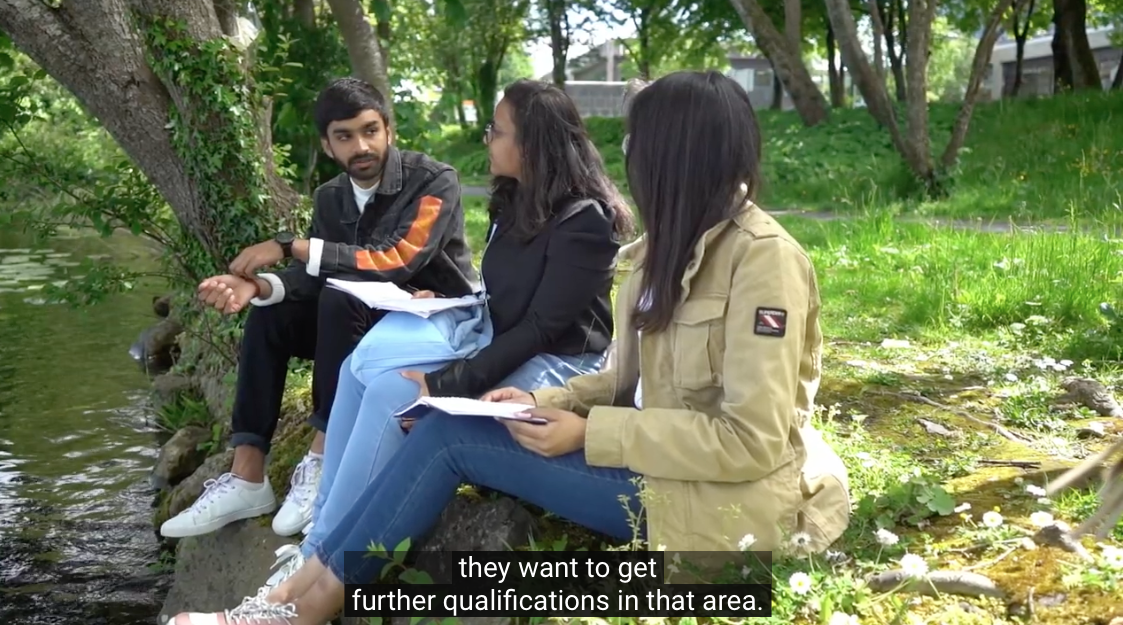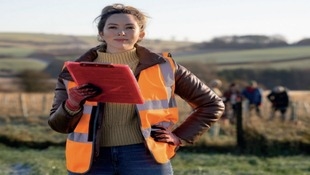-
Courses

Courses
Choosing a course is one of the most important decisions you'll ever make! View our courses and see what our students and lecturers have to say about the courses you are interested in at the links below.
-
University Life

University Life
Each year more than 4,000 choose University of Galway as their University of choice. Find out what life at University of Galway is all about here.
-
About University of Galway

About University of Galway
Since 1845, University of Galway has been sharing the highest quality teaching and research with Ireland and the world. Find out what makes our University so special – from our distinguished history to the latest news and campus developments.
-
Colleges & Schools

Colleges & Schools
University of Galway has earned international recognition as a research-led university with a commitment to top quality teaching across a range of key areas of expertise.
-
Research & Innovation

Research & Innovation
University of Galway’s vibrant research community take on some of the most pressing challenges of our times.
-
Business & Industry

Guiding Breakthrough Research at University of Galway
We explore and facilitate commercial opportunities for the research community at University of Galway, as well as facilitating industry partnership.
-
Alumni & Friends

Alumni & Friends
There are 128,000 University of Galway alumni worldwide. Stay connected to your alumni community! Join our social networks and update your details online.
-
Community Engagement

Community Engagement
At University of Galway, we believe that the best learning takes place when you apply what you learn in a real world context. That's why many of our courses include work placements or community projects.
Sustainable Environments (MSc)
Course Overview
This multidisciplinary course provides students with insight into environment, health, and sustainability issues within urban and rural environments. It integrates ecological, health and sustainability issues and considers their interaction within the natural and built environments. It combines modules from Environmental Science, Engineering and Economics to provide students with experience of research-led learning opportunities that will develop skills in identifying and evaluating sustainable solutions for real world environmental problems. Fieldtrips to learn from the practical experience of professionals are an essential element of this course. This course is open to students from a variety of backgrounds.
This course combines theory, policy and practical experience to provide its graduates with the skills and knowledge that are needed to pursue successful careers in managing sustainable environments. It provides scene setting lectures, site visits and practical work to encourage students to adopt an informed, creative and innovative approach to problem solving. It will provide students with the competences to obtain employment in environmental consultancy, policy development or proceed to further research.
Course aims:
- To systematically encourage students to adopt an informed, creative, and responsive approach to environmental and land-use problem solving.
- To integrate an international perspective to reflect both new research findings and current national and international best practice in sustainable environmental practice that can be applied within Ireland and elsewhere.
- To provide research-led learning opportunities that will develop skills in identifying and evaluating sustainable solutions for real world environmental problems.
Scholarships available
Find out about our Postgraduate Scholarships here.
--
You may also be interested in one of our other Science of Sustainability postgraduate programmes.
Applications and Selections
Who Teaches this Course
- Dr Dearbhaile Morris
- Dr Jamie Goggins,
- Dr Bryan McCabe
- Professor Martin Feely
- Dr Marcus Keane
- Daniel Coakley
- Dr Stephen Nash
- Dr Tom van Rensburg
- Dr Martin Gammell GMIT
External professionals from public, private and voluntary sector also contribute to the course.
[an error occurred while processing this directive] [an error occurred while processing this directive] [an error occurred while processing this directive] [an error occurred while processing this directive] [an error occurred while processing this directive] [an error occurred while processing this directive]Requirements and Assessment
Students should apply online through CRM Recruit, and submit a personal statement, a copy of primary degree award transcript(s), two reference contact details, at least one to be academic. International students should also demonstrate evidence of having English language proficiency at 6.5 IELTS.
Key Facts
Entry Requirements
Places are limited (15) and selection is based on each candidate’s academic record/relevant experience, personal statement, and letters of recommendation.
Applicants must have a primary degree with a second class honours, or equivalent in a relevant discipline. Relevant disciplines include science, marine science, engineering, environmental science, geography, social science, health promotion, engineering, economics or other related disciplines.
Applicants who do not have an academic background and have relevant experience are welcome to apply. They may be required to attend an interview.
Additional Requirements
Recognition of Prior Learning (RPL)
Duration
1 year, full-time
Next start date
September 2026
A Level Grades ()
Average intake
15
QQI/FET FETAC Entry Routes
Closing Date
Please view the offer rounds website.
NFQ level
Mode of study
ECTS weighting
90
Award
CAO
Course code
MSC-SEV
Course Outline
This multidisciplinary course integrates and evaluates environment, health, and sustainability issues within the natural and built environment. Students gain experience of research-led learning opportunities in Environmental Science, Engineering and Economics that will develop skills in identifying and evaluating sustainable solutions for real world problems. A key aspect is that students learn by doing. Fieldwork and site visits, where students learn from practical experience are essential elements.
The course structure is based on a 90 ECTS model, with 60 ECTS coming from taught modules. A research project in Semester 2 Summer accounts for the remaining 30 ECTS. Assessment comprises continuous assessment (C/A) solely in Semester 1, and a combination of C/A and examination for some modules in Semester 2. Students must submit a report on their research project at the end of the summer in Semester 2.
Taught modules include: Ecosystems Assessment, The Built Environment, Renewable Energy Economics and Policy, The Environment and Human Health, Environmental Problems & Solutions, Biodiversity and Conservation, Environmental Resilience, Water Quality, Energy in Buildings, and Communicating Science & Research.
Students will develop skills to appraise sustainability issues and challenges associated with (a) integrating the built and natural environments, in particular, biodiversity mitigation measures (b) landscape evaluation and nature conservation and (c) interlinkages between the environment and human health.
Students will define current practice relating to management natural and built environments in Ireland and relate this to best practice. They will evaluate environmental issues and problems, and their drivers. Specific instances may relate to particular issues such as invasive species, water quality, green space policies, or renewable energy policy economics, for example.
Students will examine policy responses in relation to sustainability in Irish urban and rural settings, and selected international case studies. They will acquire experience in best practice in identification, surveying, mapping, assessment and management techniques at species, habitat and landscape level.
Students will assess how the development and implementation of sustainability policy in the past has met the requirements of stakeholders, both in Ireland and elsewhere. They will be able to apply appropriate techniques for sustainability, for example, energy in buildings, relative to relevant legislation and policy.
Students will synthesise and explain the complexity of both natural and socio-economic systems, together with an understanding of existing and novel sustainability policy options, to develop a competency in identifying and evaluating optimal policy options. They will assess ‘reality checking’ of candidate sustainability policies, to ensure that as far as can be determined there exist no important reasons (financial, technical, social, governance) why implementation is impractical, for example, renewable energy policy and economics.
Students learn to assess the gaps in their own knowledge, and develop skills in comprehending and evaluating information from field- and site-visits, in academic journals, books and websites. Students develop competencies in both individual and group based project scoping, development and conclusion, and the coherent and succinct reporting of findings. Student manage, assess and reflect on their learning process in a reflective journal. They build on this to be able to effectively and persuasively use the evidence-base to communicate findings appropriately using a variety of fora.
Students learn from current practice in relation to the built and natural environment at international, national, regional and local levels, and based on the evaluation, recommend and implement improvements to current practice to ensure environmental resilience. Develop a realistic assessment of the challenges faced in developing and implementing policy to enhance sustainability. Demonstrate their awareness of the skillset they acquire throughout the course in a reflective journal in terms of any role that they themselves may play in advancing the roll-out of appropriate policy and actions in future.
[an error occurred while processing this directive]Why Choose This Course?
Career Opportunities
Graduates with this qualification will pursue a wide range of careers in the public, private and voluntary sector. Job opportunities exist within environmental, agri-environmental and sustainability consultancies, or as sustainability officers in companies and corporations. Graduates may also find employment within national, regional and local government sectors. Graduates may also go on to further research.
Who’s Suited to This Course
Learning Outcomes
Transferable Skills Employers Value
Work Placement
Study Abroad
Related Student Organisations
Course Fees
Fees: EU
Fees: Tuition
Fees: Student levy
Fees: Non EU
For 2026/27 entrants, where the course duration is greater than 1 year, there is an inflationary increase approved of 1.8% per annum for continuing years fees.
Postgraduate students in receipt of a SUSI grant – please note an F4 grant is where SUSI will pay €4,000 towards your tuition (2026/27). You will be liable for the remainder of the total fee. A P1 grant is where SUSI will pay tuition up to a maximum of €6,270. SUSI will not cover the student levy of €140.
Note to non-EU students: learn about the 24-month Stayback Visa here.
Find out More
Caitríona Carlin
E: caitriona.carlin@universityofgalway.ie
T: +353 91 493 863


















